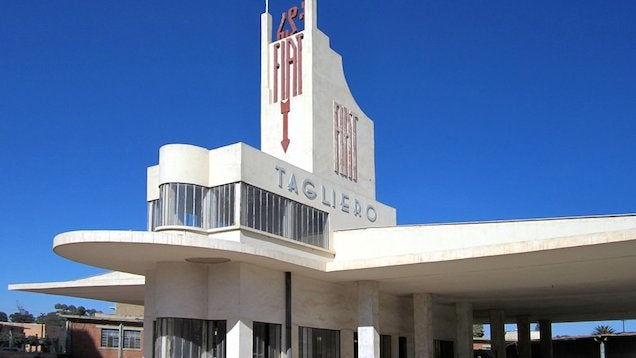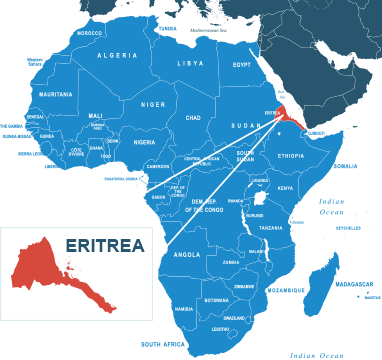 Eritrea is an interesting little country in northeast Africa, north of its archenemy Ethiopia, but like Ethiopia in being mostly a higher altitude place with a mixed race and mixed religion population and a leftist-nationalist government.
Eritrea is an interesting little country in northeast Africa, north of its archenemy Ethiopia, but like Ethiopia in being mostly a higher altitude place with a mixed race and mixed religion population and a leftist-nationalist government.
Eritrea’s capital of Asmara has some of the wildest 1930s Italian architecture in the world. Not that much was built during the Depression, but there was lots of talent putting designs on paper in the 1930s. For reasons of Mussolini’s whim, Eritrea happens to be one of the few places where 1930s designs got built in profusion.
 The average high temperature in Asmara at 7,600 feet elevation during the warmest month of the year (April) is 77 degrees. Humidity is moderate, rainfall is 20 inches per year. The climate resembles Santa Barbara.
The average high temperature in Asmara at 7,600 feet elevation during the warmest month of the year (April) is 77 degrees. Humidity is moderate, rainfall is 20 inches per year. The climate resembles Santa Barbara.
The Eritrean economy is largely propped up by remittances earned by Eritreans abroad. (For example, Eritreans appear to dominate the parking lot attendant gig in Los Angeles.)
The Eritrean government appears to have come up with a brilliant scam for getting Eritreans to the head of the line for immigrating into wealthy white countries. Eritrea nominally has a law making it illegal to leave Eritrea, so all Eritreans who do leave aren’t immigrants, they are refugees!
Plus, the government of Eritrea is not accommodating of letting foreign journalists visit Eritrea, allowing horror stories told by purported refugees to circulate unchecked in the West. Finally, a reporter from Der Spiegel has visited Eritrea and discovered its clean little secret: it’s not so bad.
It’s not so good, either, of course. It’s run by elderly war heroes long past their primes and terrified of being overthrown. But by African standards, it’s more orderly than most countries.
A Visit to ‘Africa’s North Korea’
By Bartholomäus Grill
November 02, 2017 09:39 AM
The woman smiles as she looks out the window, happy to be returning home. She is about to arrive in the Eritrean capital Asmara, a city in a valley surrounded by verdant mountains, having flown in from Frankfurt, with a stopover in Dubai. She is a middle-aged Eritrean woman who was granted political asylum in Germany, a woman who fled her country but is now returning voluntarily. She chooses to remain anonymous, because in Eritrea, illegally leaving the country is a jailable offense.
She is traveling to Eritrea as if she were a tourist. Everything proceeds normally as she passes through passport control, baggage claim and customs. She is planning to visit her family, and has brought along gifts and money for them, before boarding her return flight to Germany in two weeks. “Many are doing this,” she says, getting into a taxi. But how is it possible that people can travel unobstructed back to their native country, one decried as an evil dictatorship and accused of brutally oppressing its citizens?
Similarly, lots of Persian Jews in Beverly Hills take annual vacations back home in Iran, which can be puzzling to the more true believer neocons.
According to the government, 116,000 Eritrean refugees visited their native country last year alone. But can the figures of a regime that manipulates statistics be trusted? And what explains the visits by Eritrean expatriates? An aid worker from Finland provides an answer: The government tolerates the returnees because they bring foreign currency to the impoverished nation and are also a source of income in the form of the so-called “development tax.”
Eritrea is still run by aging national liberation warriors who won independence from Ethiopia in 1991. They conscript all young people and put many to work on labor projects for years.
Indeed, in some months it is thought that up to 5,000 young men and women flee the country. In late 2015, the UN Refugee Agency counted 474,296 refugees from Eritrea, or 10 percent of the country’s population of 5 million. Some 92 percent of the Eritreans who applied for asylum in Germany in 2016 were recognized, while 81 percent were recognized in 2017. Syrian refugees were the only group with a higher acceptance rate.
Eritrean refugees base their asylum applications on human rights violations, which are sharply criticized by the United Nations. The UN report soberly concludes that the regime in Eritrea employs “totalitarian practices” that instill a constant state of fear in its citizens.
At first glance, there is no evidence of this fear in Asmara. People go about their business in the city’s markets, young women wearing jeans walk along the streets and men sit chatting in the cafes.
Eritrea is one of the last Bonapartist-Nasserite regimes run by secular modernizing military men. They figure if they stepped down, the Muslims and Christian would be at each other’s throats in a few minutes.
Or maybe they just like being in power.
Anyway, it’s in the interest of both the regime and the emigres for stories to circulate about how horrible things are back in Eritrea so the Eritreans get refugee status and can send money home
[Comment at Unz.com]